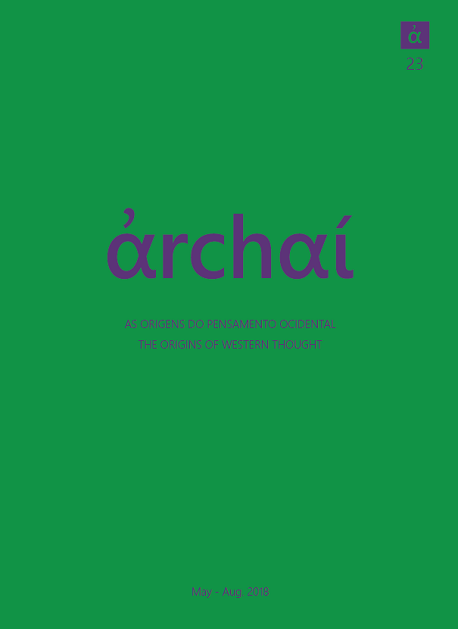The proem of Aristotle’s Metaphysics
an interpretation of Metaph. A1
DOI:
https://doi.org/10.14195/1984-249X_23_1Keywords:
Metaphysics, proem, σοφίαAbstract
Based on the notion of proem as exposed in Aristotle’s Rhetoric, we examine in detail Metaph. A1. Our goal is to understand the argument contained in this chapter, as we also endeavour to show how the Stagirite introduces with uttermost caution the theme of wisdom [σοφία], that which is the incarnation of the preeminent science in the first book of the Metaphysics. The attention we devote to the proem of this work is explained by the importance we attribute, unlike much of contemporary scholars, to σοφία, that is, the science of first causes and principles, which we consider to be, ultimately, the pivotal formulation of the supreme science in the Metaphysics.
Downloads
References
ALLAN, D. J. (1983). A filosofia de Aristóteles. Lisboa, Editorial Presença.
ANGIONI, L. (2002). Aristóteles. Metafísica: livros I, II e III (Tradução, introdução e notas). Campinas,UNICAMP/IFCH
MACRAN, H. S. (1902). Aristóxeno. The Har-monics of Aristoxenus (edited with translation no-tes and introduction and index of words). Oxford, Clarendon Press.
BYWATER, I. (1890). Aristoteles. Ethica Nico-machea (recognovit brevique adnotatione critica instruxit). Oxford, Clarendon Press. (Coleção Oxford Classical Texts).
COLLE, G. (1912). Aristote. La Métaphysique, livre Ier (traduction et commentaire). Louvain, Institut Supérieur de Philosophie de l’Université de Louvain. (Coleção Traductions et Études).
DÜRING, I. (1990). Aristóteles: Exposición e Inter-pretación de su Pensamiento. Coyoacán, Universidad Nacional Autónoma de México.JAEGER, W. (1956). Contemporary evidence on the text of the first chapters of Aristotle’s Metaphysics. Studi Italiani di Filologia Classica 27/28, p. 150-156.
MENN, S. (2006). Aristotle. In: BORCHERT, Donald (ed.). Encyclopedia of Philosophy. Farmington Hills. Macmillan, p. 263-288. 10 vols.
MENN, S. [20--]. The Aim and the Argument of Aristotle’s Metaphysics. [s.l.], [s.n.]. URL=https://www.philosophie.hu-berlin.de/de/lehrbereiche/antike/mitarbeiter/menn/contents. Disponível em: 29 de Agosto de 2016.
OWENS, J. (1978). The Doctrine of Being in the Aristotelian ‘Metaphysics’: A Study in the Greek Background of
Medieval Thought. Toronto, Pontifical Institute of Mediaeval Studies.
REALE, G. (2005). Aristóteles. Metafísica (ensaio introdutório, texto grego com tradução e comentá-rio). 3 vols. São Paulo, Loyola.
ROSS, W. D. (1958). Aristoteles. Metaphysica (recognovit brevique adnotatione critica instruxit). (Coleção Oxford Classical Texts). 2 vols. Oxford, Clarendon Press.
CATHALA, M. R.; SPIAZZI, R. M. (1950). (ed.). S. Thomae de Aquino. In duodecim libros Metaphysicorum Aristotelis expositio. Torino, Marietti.
WIRTH, C. (1884). Aristoteles. Die ersten drei Kapitel der Metaphysik des Aristoteles (Grundtext, deutsche Übersetzung und kritisch-exegetischer Kommentar). Bayreuth, Schröder.
Downloads
Published
How to Cite
Issue
Section
License
Given the public access policy of the journal, the use of the published texts is free, with the obligation of recognizing the original authorship and the first publication in this journal. The authors of the published contributions are entirely and exclusively responsible for their contents.
1. The authors authorize the publication of the article in this journal.
2. The authors guarantee that the contribution is original, and take full responsibility for its content in case of impugnation by third parties.
3. The authors guarantee that the contribution is not under evaluation in another journal.
4. The authors keep the copyright and convey to the journal the right of first publication, the work being licensed under a Creative Commons Attribution License-BY.
5. The authors are allowed and stimulated to publicize and distribute their work on-line after the publication in the journal.
6. The authors of the approved works authorize the journal to distribute their content, after publication, for reproduction in content indexes, virtual libraries and similars.
7. The editors reserve the right to make adjustments to the text and to adequate the article to the editorial rules of the journal.



